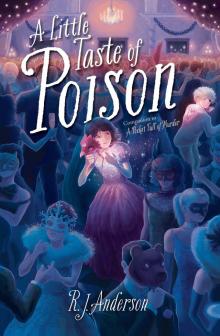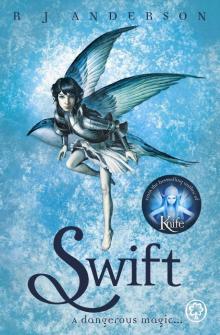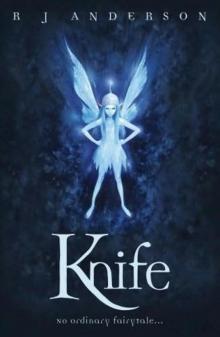- Home
- R. J. Anderson
Nomad Page 7
Nomad Read online
Page 7
“Of course she did,” said Ivy. “Everybody did. But they put it down to grief over losing Mum, and not having anyone to take proper care of him, and all sorts of other things.” She swallowed, remembering how many times she’d lain awake listening to her father coughing. She’d urged him to see Yarrow the healer about it, but he never would. “Even I thought he’d stopped caring, and was trying to work himself to death. I didn’t realize he was deliberately poisoning himself until it was too late.”
“Deliberately?” Jenny looked aghast. “Why?”
A ladybug waddled under the overhang, big as Ivy’s thumbnail at piskey size. She brushed it away, and it whirred off into the sunlight. “He could never forgive himself for letting Mum go. But mostly I think he believed it was the only way to convince Betony and everyone else that the poison was real. If the strongest knocker in the Delve could get sick from it, sick enough to die…”
“Then the Joan would have to do something,” finished Jenny softly.
“But he never got the chance to show Betony what the poison had done to him. And I’m not sure my aunt would have listened, anyway. She’d probably just have blamed his sickness on my mother.” She could picture Betony standing by Flint’s deathbed, saying coldly, You brought this on yourself. I warned you not to marry that woman.
Jenny covered her mouth as though shocked, but broke into a barking cough instead. “Sorry,” she whispered. “I was trying to hold it, but—” She coughed again, and wiped her eyes with her apron.
“But if your mum was right,” she went on when she could speak, “there’s been poison in the Delve for years. Why are the rest of us only getting sick now? Shouldn’t we have noticed it sooner?”
“It’s not just happening now,” said Ivy. “Look at me, born without wings. How often have you heard the younger children complaining that their stomachs hurt, or the aunties grumbling about aches that won’t go away? And the old uncles, who’ve spent years working in the diggings—is it natural for them to wither up and die before they’re even a hundred, with yellow teeth and their grey hair falling out?”
Jenny lowered her eyes, and made no answer.
“I’m not saying my aunt’s evil,” Ivy went on, “or that she doesn’t care. But I think she only sees what she wants to see, because if she admits the Delve’s not safe, then—”
A shadow fell across their hiding place, and Ivy broke off. She saw Jenny mouth spriggan, and scramble back in terror. But Ivy’s heart pounded for an entirely different reason as a big hand seized her arm, pulling her out into the sunlight, and she looked up—and up—into a face she knew all too well.
“Then what?” asked Mattock.
“Matt!” exclaimed Ivy, pulling free of the young hunter with an effort—an effort that would surely have failed, if he hadn’t been willing to let her go. “What are you doing here?”
It was a ridiculous thing to say, but her wits had scattered like windblown feathers at the sight of him standing there. Had he come alone? How much had he overheard of her conversation with Jenny?
“I was coming back from Redruth,” Matt replied, his blue eyes searching hers. “I heard someone cough, and I went to see…”
Then a grin broke over his face like the sunrise, and he snatched Ivy up and whirled her around. “I knew it was you! I knew you’d come back, no matter what Mica said.”
“Mica?” gasped Ivy, smothered against his chest. “What—did he say?”
“I told him I’d thought I’d seen you yesterday. He told me… Well, anyway, he said I was wrong.” He must have noticed he was crushing Ivy, because he released her and stepped back, his color rising. “Sorry. I’m just glad you’re here.”
Ivy dared a glance at Jenny, but the other girl had vanished into the shadows beneath the rock. “I don’t know why,” she said distractedly.
“Because you saved my life, that’s why. You saved everyone in the Delve from that faery’s curse, and I don’t care how many old traditions you had to break to do it.” He took her small, thin hand between his big ones, clasping it like something precious. “You always wanted to fly. I’m glad you found a way.”
Ivy’s throat tightened. “Mica told you.”
“Only because I got him drunk and dragged it out of him. After all you’d done for the Delve, I couldn’t believe you’d just take Cicely and disappear. I couldn’t understand why he let you.”
“So…” She was afraid of the answer, but she had to know. “What else did he tell you?”
“Not much.” He scratched at the collar of his shirt, as though it were itching him. He was dressed in a loose jacket, buttoned shirt and jeans held up by braces, the same clothes he wore on every trip to the human world—though the outfit had never looked quite natural on him, and at piskey size it looked even stranger. “When I asked him what made you leave, he said he was sick of thinking about it. Then he fell asleep on the table.”
So he’d given away Ivy’s most dangerous secret, but he couldn’t be bothered to explain to Mattock that she’d been forced to leave the Delve against her will. That sounded like Mica, all right. “Where is he now?” she asked, with some apprehension.
“He didn’t want to come.” Mattock’s expression turned bleak. “He’s… not been the same, since you and Cicely went away.” He paused, stooped under the rock and added, “Isn’t that right, Jenny?”
Ivy’s heart skipped a beat. “It’s not her fault—” she began to protest, but Jenny interrupted her.
“Never mind, Ivy. Mattock won’t tell.” She slid out from beneath the overhang and clambered to her feet, brushing off her long skirt. “Will you, Matt?”
“You shouldn’t be out here, Jenny. It’s not safe.” His gaze flicked to Ivy, reproachful. “You know that.”
“If it’s safe enough for Ivy,” she retorted, “it’s safe enough for me. Anyway, what’s going to hurt us this close to the Delve?”
As though she hadn’t been terrified, only a minute ago, that Mattock was a spriggan come to carry her away. “Besides,” Ivy added before Matt could argue, “Nettle told me there hasn’t been a spriggan sighted near the Delve in over thirty years.”
There was a stunned pause. “What?” Jenny whispered, and Matt echoed: “What? That’s ridiculous! Mica and I caught a spriggan just a few weeks ago!”
“You mean the stranger you beat senseless and chained up at the bottom of the Great Shaft?” Ivy knew she was flying in stormy weather by speaking so frankly, but Jenny needed to hear the truth. “He didn’t even know what a spriggan was. He’d only come to the Delve because my mother sent him to find me.”
“You talked to him?” Mattock’s face darkened, then went pale. “You’re the one who let him go. And he was the one who…”
“Led me to my mother, yes,” cut in Ivy. She knew he’d been about to say taught you to change shape, but Jenny was shocked enough already. “The point is, he was never any threat to the Delve. The real threat was Gillian, and she’s dead now. There are no spriggans or evil faeries hunting us anymore, and that means—”
“We don’t have to stay underground.” Jenny sank back onto the rocks, staring into the distance. “We’ve been trapped down there all this time, breathing poison, for nothing.”
Mattock cast Ivy a hard look, and crouched in front of Jenny. “It’s not nothing,” he said. “There are more dangers on the surface than spriggans. Why do you think we hunters train for months before we’re allowed to go outside? There are wild animals out there, and… and all kinds of other things. It’s not safe to let everyone go wandering about, don’t you see?”
“Oh, I see,” said Jenny, with a cracked little laugh. “I see that you hunters have no reason to want anything to change. You’re free to go outside whenever you please, because you’re so big and strong and what you do is so important. We girls can stay below and rot, for all you care.”
“That’s not true.” Matt spoke evenly, but his jaw was tight with anger. “And you’re wrong to think we hunters have nothing
to lose. What do you think happens to us once we get too slow to hunt anymore, or have sons old enough to hunt for us? We go straight down to join the knockers in the diggings, where the air’s worst of all.”
“But by then you’ve had twenty or thirty years of fresh air and freedom,” Jenny said. “And even as a knocker, nobody’s going to stop you going above for a pipe or a stroll. Nobody’s going to say, ‘You can’t do that, it’s not safe for the likes of you.’ But we women hear that all our lives.”
She turned appealing eyes to Ivy. “When Cicely went missing the first time, and you went to look for her—I thought the spriggans had got you for sure, and I’d never see you again. But when you came back to help us fight Gillian and I saw how healthy you were, how strong and alive… I wasn’t sure what to make of it. But now it all makes sense.”
“Jenny,” said Mattock, but she ignored him and clutched Ivy’s hand.
“I understand now why you had to leave. And why you had to come back, no matter what Betony said. We needed you to tell us the truth.”
Mattock muttered a curse and sat down on the rocks, dragging his hands over his face. “All right,” he said, “let’s say it is the truth. The surface is safe, or at least safer than we’ve always thought, and the Delve is poisoned. But if the bit of your conversation I overheard is anything to go by, the Joan doesn’t see it that way. So what can any of us do about it?”
“She won’t listen to me,” said Ivy. “She thinks I’m trying to stir up trouble in the Delve. But if someone can make her see that it’s not just the weak ones or the old ones who are getting sick, but all of us, and that the best way to cure it is to get our people outside…” She walked a few steps down the trail, frowning in thought. Then it came to her, and she whirled on the others in excitement. “Yarrow! She’s the Delve’s healer: she knows how many piskeys have come to her complaining of one thing or another. She could talk to Betony for us.”
Mattock looked dubious, but Jenny brightened. “Yes, of course!” she said. “The Joan would listen to her, I’m sure. But do you think she’ll do it? Yarrow’s very… quiet.”
Ivy knew what the other girl meant. No one would question the healer woman’s skills, or complain of the way she treated her patients. But she was unusually reserved for a piskey, and she was also young—only a few years older than Ivy and Jenny. It was hard to imagine her approaching the Joan without a summons, let alone arguing with her.
“Maybe not alone,” Ivy admitted. “But if we could convince a few of the sicker ones to go along with her, she might.” She turned to Mattock. “Would you do that? Keep an eye out for piskeys who seem especially unwell, and see if they’d be willing to talk to the Joan about it?”
“I don’t know, Ivy.” He spoke without looking up. “People can be touchy about these things. Nobody likes to admit they’re not as strong as they used to be, or that there might be something wrong with them that they can’t fix. It’s not the piskey way to complain.”
“You mean it’s not the way of the menfolk,” said Jenny. “The women and children aren’t so proud as all that. Or at least they have enough common sense to know when they need help.” She looked at Ivy. “I’ll ask my mum. And maybe one or two of the neighbors, if they’re willing to talk about it.”
“Will you talk to Yarrow, too?” asked Ivy. “I know it won’t be easy to get her alone, especially if there are so many piskeys coming to see her. But if you offered to grind herbs for her, or help her with the records…”
Jenny nodded. “I’ll try.”
“But you’ll have to be careful,” Ivy warned. “If any of this gets back to my aunt before we’re ready, she might think we’re plotting against her.” And if Betony felt threatened, she would act quickly—and ruthlessly—to eliminate the threat.
“I know.” Jenny gave a tiny smile. “Don’t worry. I’m always careful.”
“Not careful enough, if I could hear you coughing halfway across the hillside,” said Mattock. “If you want to meet again, we’d best find a safer place to do it.”
“We?” asked Ivy. “I thought you were against this idea.” In fact, she’d begun to fear he’d try to stop them. He’d seemed thrilled to see Ivy at first, willing to overlook any transgression she’d committed. But all that had changed when she’d confessed to letting Martin go.
“I don’t much like it, I’ll admit.” Mattock pushed himself to his feet, his square face somber. “But I’ve seen enough to know that you and Jenny are right. The Delve’s not safe anymore. And if all we need is a bit more evidence to convince the Joan…” His mouth curled ruefully. “Then I’d be a fool not to help you.”
Relief swept through Ivy like a cleansing breeze. She threw her arms about Mattock and hugged him. “Dear old Matt,” she said. “I should have known I could count on you. There’s just one thing.”
Mattock looked at her.
“You can’t tell Mica about this. Not that you’ve seen me, not that we’ve talked, not what we’re doing. Please.”
“Ivy…”
“I know.” She lowered her eyes, not wanting to see his disappointment. “I know he’s your best friend. But he wouldn’t understand, Matt. He doesn’t understand anything about me.”
Matt was quiet so long that Ivy feared he would refuse. But at last he said, “If that’s what you want.”
Ivy broke into a smile. “Then it’s settled,” she said, hooking an arm around his waist and reaching out to draw Jenny into their circle. “Where shall we meet next time?”
When Ivy returned to the hotel she expected to find Martin out on some errand—or else lounging in the armchair, awaiting her report. But he lay atop the unmade bed, curled in on himself with his jacket clutched tight to his chest. His teeth were gritted, his breath came in shuddering gasps, and when the floor creaked beneath Ivy’s cautious step, he flinched. But his eyes stayed closed beneath the drift of his hair, and when she whispered his name, he didn’t answer.
Martin had told her that he didn’t dream. But whatever was happening in his mind right now, he wasn’t enjoying it. Ivy hesitated, wondering if she ought to shake him, then thought better of the idea. She’d waked Mica once in the middle of a nightmare, and he’d flailed out and smacked her in the face. Instead, Ivy took the coverlet from the foot of the bed, and drew it up over Martin’s shivering body. Then she brushed the hair back from his brow and let her hand rest there, as she used to do for Cicely when her little sister had a bad dream.
Martin relaxed, rolled over in a languid movement and stretched. He gazed drowsily at Ivy—then jerked upright, his face hardening to anger.
“How long have you been here?” he demanded, flinging back the coverlet as though it disgusted him. “How long was I asleep?”
“I don’t know,” said Ivy, taken aback. “I just got here.” She stepped hastily out of Martin’s way as he leaped from the bed. “Where are you going?”
Martin stopped, fingers hovering above the doorknob. Then he let his hand drop, and turned back to her. “My apologies,” he said. “I didn’t expect you back so soon.”
He was trying to save his dignity, and Ivy knew she ought to let him, but her curiosity was too strong. “What was all that about?”
“All what?”
She gestured to the bed. “Is it always like this, when you sleep in your own shape? Is that why you fly off every night?”
“I have no idea what you mean.” He spoke calmly, but every line of his body was tense. “I don’t like people staring at me when I’m asleep, that’s all.”
Ivy sat down on the end of the bed, unsure whether to believe him. Could he really be so oblivious to what was going on in his own mind?
“You looked like you were having a nightmare,” she said. “A bad one. Are you sure you’ve never been able to dream? Even when you were a child?”
Martin folded his arms and leaned against the doorframe. “I don’t remember much of anything about my childhood,” he said. “The first memory I have is of walking along a
road at night, and getting hit by a car.”
He must have seen the shock on Ivy’s face, because he went on mildly, “Not badly. It was only a glancing blow. But the police came to investigate, and when I wouldn’t—couldn’t—tell them where I lived or who my parents were, they put me in foster care.”
Ivy had learned about police during the weeks she’d spent with her mother in Truro, but she’d thought they only punished lawbreakers. “What does that mean?”
“Well, in my case, it meant that for nearly a year I was shuffled from one human family to another, until I ended up with an old woman who called me a devil and gave me the same food she fed her cats. I think,” he added reflectively, “that I might have scared her to death.”
“Stop trying to frighten me,” said Ivy. “If you don’t want to talk about it, just say so. What happened?”
“She accused me of stealing her money,” he said, “and came after me with a wooden spoon. I flung up my hand to ward her off, and all her dishes flew out of the cupboard and smashed to bits on the ceiling. She turned grey and clutched her chest, and I ran. The last I saw of her was the ambulance taking her away.”
His tone was neutral, but the line between his brows said otherwise. “It wasn’t your fault,” said Ivy.
“Not the heart attack, perhaps,” said Martin. “But she wasn’t wrong about the money.” He gave a thin smile. “Not that it lasted long, once I was on my own. I ended up living in an old crate in one of the grimier parts of London, and by the time the Empress found me, I’d have done just about anything for a hot meal and a pair of clean sheets.”
“How old were you then?” Ivy asked.
“Thirteen, maybe? I couldn’t say. All I know is that I’d been on the streets for well over a year.”
So he’d been eleven or twelve when the humans found him. Still more a child than a man, but surely old enough to remember something about his past? Either he’d lost his memory in the accident, or…

 Quicksilver
Quicksilver Knife
Knife Arrow
Arrow Ultraviolet
Ultraviolet Wayfarer
Wayfarer A Little Taste of Poison
A Little Taste of Poison Nomad
Nomad Torch
Torch Rebel fr-2
Rebel fr-2 Swift
Swift Faery Rebels
Faery Rebels Spell Hunter fr-1
Spell Hunter fr-1